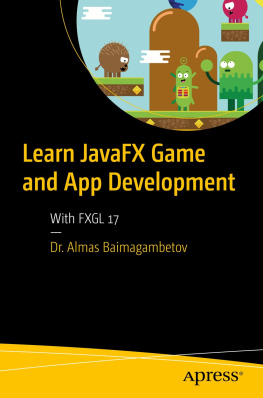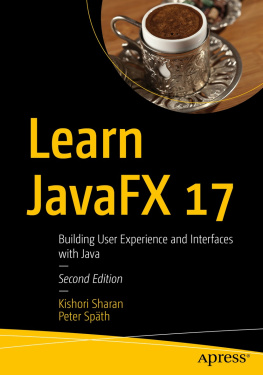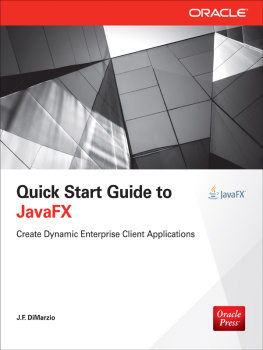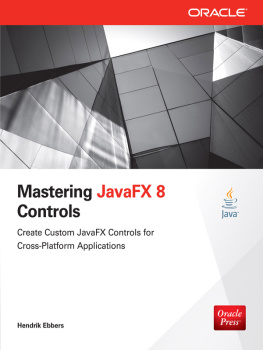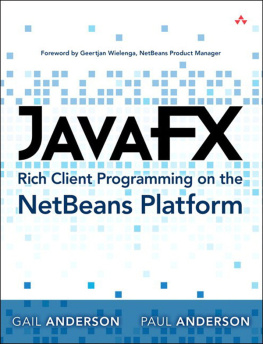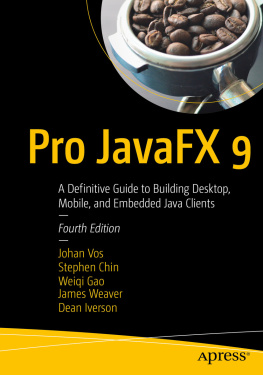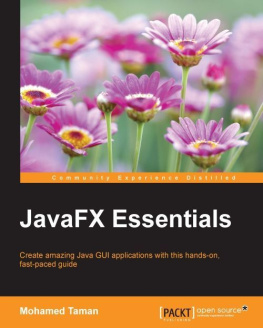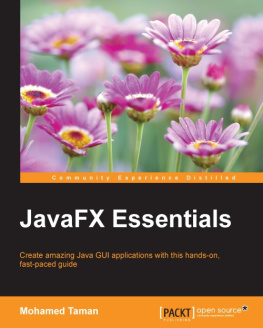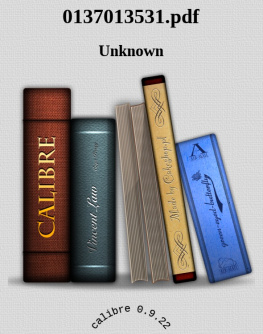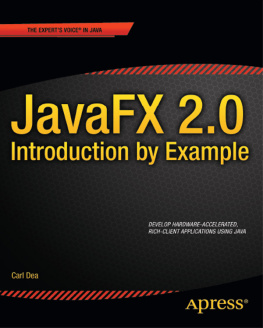Mastering JavaFX 8 Controls
Hendrik Ebbers
New York Chicago San Francisco
Athens London Madrid Mexico City
Milan New Delhi Singapore Sydney Toronto
Copyright 2014 by Itzy. All rights reserved. Printed in the United States of America. Except as permitted under the Copyright Act of 1976, no part of this publication may be reproduced or distributed in any form or by any means, or stored in a database or retrieval system, without the prior written permission of Publisher, with the exception that the program listings may be entered, stored, and executed in a computer system, but they may not be reproduced for publication.
ISBN: 978-0-07-183378-3
MHID: 0-07-183378-1
e-Book conversion by Cenveo Publisher Services
Version 1.0
The material in this eBook also appears in the print version of this title: ISBN: 978-0-07-183377-6, MHID: 0-07-183377-3.
McGraw-Hill Education eBooks are available at special quantity discounts to use as premiums and sales promotions, or for use in corporate training programs. To contact a representative, please visit the Contact Us pages at www.mhprofessional.com.
All trademarks are trademarks of their respective owners. Rather than put a trademark symbol after every occurrence of a trademarked name, we use names in an editorial fashion only, and to the benefit of the trademark owner, with no intention of infringement of the trademark. Where such designations appear in this book, they have been printed with initial caps.
Oracle and Java are registered trademarks of Oracle Corporation and/or its affiliates. All other trademarks are the property of their respective owners, and McGraw-Hill Education makes no claim of ownership by the mention of products that contain these marks.
Screen displays of copyrighted Oracle software programs have been reproduced herein with the permission of Oracle Corporation and/or its affiliates.
Information has been obtained by Publisher from sources believed to be reliable. However, because of the possibility of human or mechanical error by our sources, Publisher, or others, Publisher does not guarantee to the accuracy, adequacy, or completeness of any information included in this work and is not responsible for any errors or omissions or the results obtained from the use of such information.
Oracle Corporation does not make any representations or warranties as to the accuracy, adequacy, or completeness of any information contained in this Work, and is not responsible for any errors or omissions.
TERMS OF USE
This is a copyrighted work and McGraw-Hill Education (McGraw-Hill) and its licensors reserve all rights in and to the work. Use of this work is subject to these terms. Except as permitted under the Copyright Act of 1976 and the right to store and retrieve one copy of the work, you may not decompile, disassemble, reverse engineer, reproduce, modify, create derivative works based upon, transmit, distribute, disseminate, sell, publish or sublicense the work or any part of it without McGraw-Hills prior consent. You may use the work for your own noncommercial and personal use; any other use of the work is strictly prohibited. Your right to use the work may be terminated if you fail to comply with these terms.
THE WORK IS PROVIDED AS IS. McGRAW-HILL AND ITS LICENSORS MAKE NO GUARANTEES OR WARRANTIES AS TO THE ACCURACY, ADEQUACY OR COMPLETENESS OF OR RESULTS TO BE OBTAINED FROM USING THE WORK, INCLUDING ANY INFORMATION THAT CAN BE ACCESSED THROUGH THE WORK VIA HYPERLINK OR OTHERWISE, AND EXPRESSLY DISCLAIM ANY WARRANTY, EXPRESS OR IMPLIED, INCLUDING BUT NOT LIMITED TO IMPLIED WARRANTIES OF MERCHANTABILITY OR FITNESS FOR A PARTICULAR PURPOSE. McGraw-Hill and its licensors do not warrant or guarantee that the functions contained in the work will meet your requirements or that its operation will be uninterrupted or error free. Neither McGraw-Hill nor its licensors shall be liable to you or anyone else for any inaccuracy, error or omission, regardless of cause, in the work or for any damages resulting therefrom. McGraw-Hill has no responsibility for the content of any information accessed through the work. Under no circumstances shall McGraw-Hill and/or its licensors be liable for any indirect, incidental, special, punitive, consequential or similar damages that result from the use of or inability to use the work, even if any of them has been advised of the possibility of such damages. This limitation of liability shall apply to any claim or cause whatsoever whether such claim or cause arises in contract, tort or otherwise.
For SilkeBecause you helped me every day writing this book. I wrote this book in my free time, so there were weeks where I completely disappeared from normal home life. You managed everything alone, and in addition you backed me when I became frustrated about this project. Without you, I couldnt have managed this.
For the JavaFX communityBecause without the awesome community, I would have never been in the position to write this book.
For my fatherBecause you taught me that you can create everything you imagine if you have enough courage to take hold of it.
For all of my friends and familyBecause you heard me talking about this book too many times but still listened to me.
About the Author
Hendrik Ebbers is senior Java architect at Materna GmbH in Dortmund, Germany. His main focus besides research and development is primarily in the areas of JavaFX, middleware, and DevOps. Additionally, Hendrik is founder and leader of the Java User Group Dortmund and gives talks and presentations in user groups and international conferences. He blogs about UI-related topics at www.guigarage.com (or on Twitter @hendrikEbbers) and contributes to some open source projects such as DataFX, BoxFX, AquaFX, and Vagrant-Binding.
About the Technical Editor
Simon Ritter works as a Java technology evangelist for Oracle Corporation and Sun Microsystems before that. He has been developing Java code since JDK 1.0 and has been involved in JavaFX since its launch as a scripting language.
JavaFX from a Developers Point of View
My background is in a lot of Swing development and web application creation. For web applications, I mostly used plain HTML or JSF to create the views, and I did some little applications with most of the other technologies (Adobe Flex, Flash, Android, Wicket, GWT, and so on) to learn more about these UI toolkits over the years.
For me, JavaFX is a perfect combination of most of the best practices that have come out of these technologies. For a Swing developer, most of the basic JavaFX APIs are easy to learn because the main concepts seem to be similar when looking at the framework. Under the hood, most of the technologies are different, but you can structure an application in a better way by using FXML and CSS, for example. Compared to HTML applications, JavaFX development is much easier for me because theoretically, you can do whatever you want and dont need to think about cross-browser behavior and all that stuff. You can create the complete view by using What You See Is What You Get (WYSIWYG) editors like Scene Builder and use your favorite Java IDE for development.


